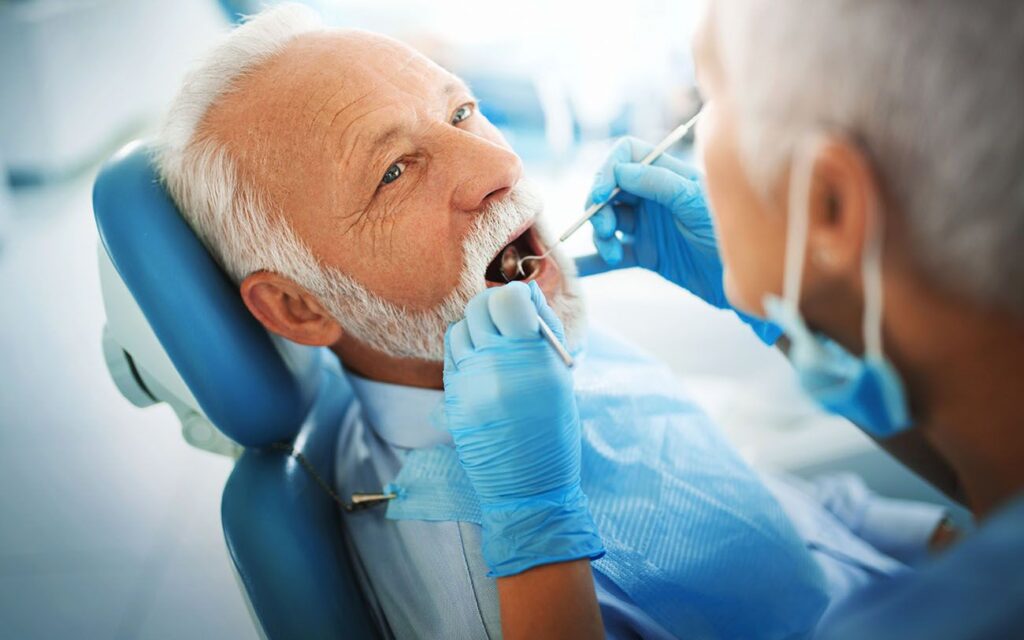For some people, going to the dentist is not a fun trip. Fear and anxiety create an atmosphere that may keep people away from their appointments. If you are uncomfortable or anxious at the dentist’s office, you are not alone.
According to the American Dental Hygienists Association, between 50% and 80% of adults have some level of dental anxiety. When you experience dental anxiety, you may be more likely to avoid your regular dental appointments.
Many people only go to the dentist when they are in pain, especially if they have anxiety. Because dental cleanings are a routine procedure, patients don’t realize their importance.

Prevent Gum Disease
When you receive a dental cleaning, a dental hygienist will remove plaque from all surfaces of your teeth and soft tissues. Plaque is a type of harmful bacteria that clings to your teeth. If you don’t remove it properly, it can irritate and inflame your gums. This is the first stage of gum disease, which is an infection of the gums. Over time, gum disease can cause bad breath, missing teeth, and bone deterioration.
However, a simple dental cleaning can help prevent gum disease. During your exam, your hygienist will floss your teeth using a special technique. Their method is more efficient than you can do at home. Therefore, your teeth will be cleaner and healthier.
Minimize Tooth Decay
One of the major parts of dental cleaning is the removal of plaque. To get rid of the plaque buildup, a dental hygienist will scrape your teeth using a scaler. This is a curved metal device that has a thin point. With this point, your hygienist can reach between your teeth and other hard-to-reach areas.
When you brush your teeth, it is difficult to get the back of your teeth or between them. However, a dental cleaning can fully remove this harmful bacteria.
Plaque reacts with sugar and leftover food particles to create acid. This acid will eat away at your enamel, creating small pits or cavities. Without treatment, tooth decay can cause pain, infection, and missing teeth. Making your regular dental cleanings can help prevent tooth decay.
Provide Preventative Dentistry
One of the services provided during a dental cleaning is an X-ray. X-rays allow your dental team to get a complete picture of your dental health. While your dentist and hygienist will thoroughly examine your mouth, an X-ray will show what their eyes cannot see.
In addition, there are many dental issues that can develop beneath the surfaces of your teeth and tissues. This allows them to address problems before they cause too much damage.
Brighter Smile
Getting regular dental cleanings can help brighten and whiten your smile. During your cleaning, your hygienist will use a high-powered brush to buff your teeth. This helps polish and shine your teeth. As a result, this brush will also help remove surface stains. You will notice a brighter smile after your dental cleanings.
Frequently Asked Questions
Can dental cleanings reverse early-stage gum disease?
Yes, dental cleanings can reverse gingivitis, the earliest stage of gum disease. Removing plaque and tartar lets your gums heal and reduces inflammation. Regular cleanings and good home care help stop it from progressing.
What’s the difference between a regular cleaning and a deep cleaning?
A regular cleaning focuses on removing plaque and tartar above the gumline. A deep cleaning, or scaling and root planing, removes buildup below the gumline and smooths the tooth roots. Deep cleanings treat gum disease, while regular cleanings maintain healthy gums.
What happens if I skip dental cleanings for a long time?
Skipping cleanings allows plaque and tartar to build up, increasing your risk for cavities and gum disease. Over time, untreated gum disease can lead to bone loss and tooth loss. Delaying cleanings may also require more intensive treatments later.
Do dental cleanings hurt or cause discomfort?
Most dental cleanings don’t hurt, but you may feel mild pressure or scraping. If your gums are inflamed or sensitive, there may be some discomfort. Let your dentist know if you need numbing or gentler techniques.
Do dental cleanings affect dental restorations, such as crowns or fillings?
No, cleanings don’t damage crowns, fillings, or other restorations. Dental tools are safe for restorations and help clean the area around them. Your dentist may use special polishing to protect them.
Is fluoride treatment part of a dental cleaning?
Fluoride treatment is often offered at the end of a cleaning, but isn’t always included. It strengthens enamel and helps prevent cavities. Your dentist may recommend it based on your cavity risk.
